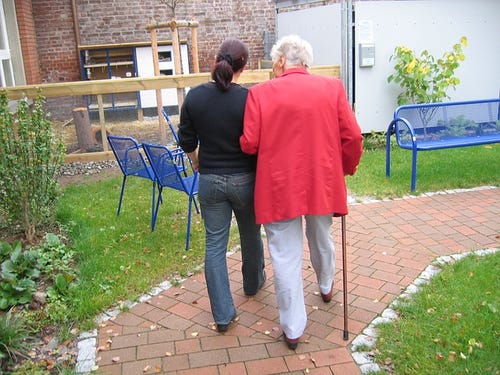What Caregivers Really Want from Digital Health
July 7, 2017
A new survey asked family caregivers what technology tools they really need, and the results might surprise you.
Jamie Hartford

Non-professional caregivers represent a huge market for medtech companies. In 2015, AARP and the National Alliance for Caregiving estimated that around 43.7 million people in the United States provide unpaid care to an adult or child. To put that in perspective, it's almost as much as the number of people in the country living with diabetes (29 million in 2014, according to the U.S. Centers for Disease Control and Prevention) and cancer (14.7 million, according to the National Cancer Institute) combined. What's more, with an aging population, longer life expectancy, and Medicaid cuts possibly on the horizon, the number of non-paid caregivers is expected to climb in the coming years.
Anyone who has cared for a family member knows it's not easy. A recent survey by the Massachusetts eHelath Institute of 700 non-professional caregivers in the state showed that in addition to giving medicine, attending to wounds, and providing other medical or nursing care, caregivers are often performing daily tasks like grocery shopping, transportation, housework, meal preparation, and financial management. Around three-quarters of survey respondents said caregiving is one of the most significant or the most significant aspects of their life right now, and two-thirds said they never, rarely, or only sometimes can take a break from caregiving if they needed it. Not surprisingly, this leads many caregivers to feel stressed, overwhelmed, burned out, depressed, and isolated.
Digital health tools exist to help these caregivers, but more than a quarter said they don't use tools like smartphones, tablets, apps, and computer programs to provide and coordinate care, according to the "Caregivers and Digital Health" survey. Many (58%) said they're simply unaware of the technologies available to help, but 56% said they haven't found a tool that addresses their specific needs.
So what technologies do family caregivers really want? According to the survey, they would find tools that accomplish the following tasks to be "very appealing":
Provide access to test results and other medical records in one place (57%)
Help me find out reliable information about the needs and conditions of the people I care for (52%)
Allow me to share information directly with doctors and other service providers (51%)
Allow me to communicate with everyone responsible for coordinating care (51%)
Help me understand insurance benefits and navigate the insurance claims system (49%)
Help me organize and manage many aspects of care, rather than just one or two, in one place (48%)
Help me balance everyday life with my responsibilities as a caregiver (44%)
Remind the people I care for to take their medicine or eat a meal (44%)
Help me discover and learn about caregiver products and services (44%)
Connecting me with caregivers who could fill in when needed (36%)
Help me connect to other caregivers for support or conversation (35%)
Help me feel less alone and/or guilty (35%)
Provide a support network of other caregivers in similar situations (34%)
Jamie Hartford is director of content for medtech brands in UBM's Advanced Manufacturing Group. Reach her at [email protected].
About the Author(s)
You May Also Like

.png?width=300&auto=webp&quality=80&disable=upscale)
